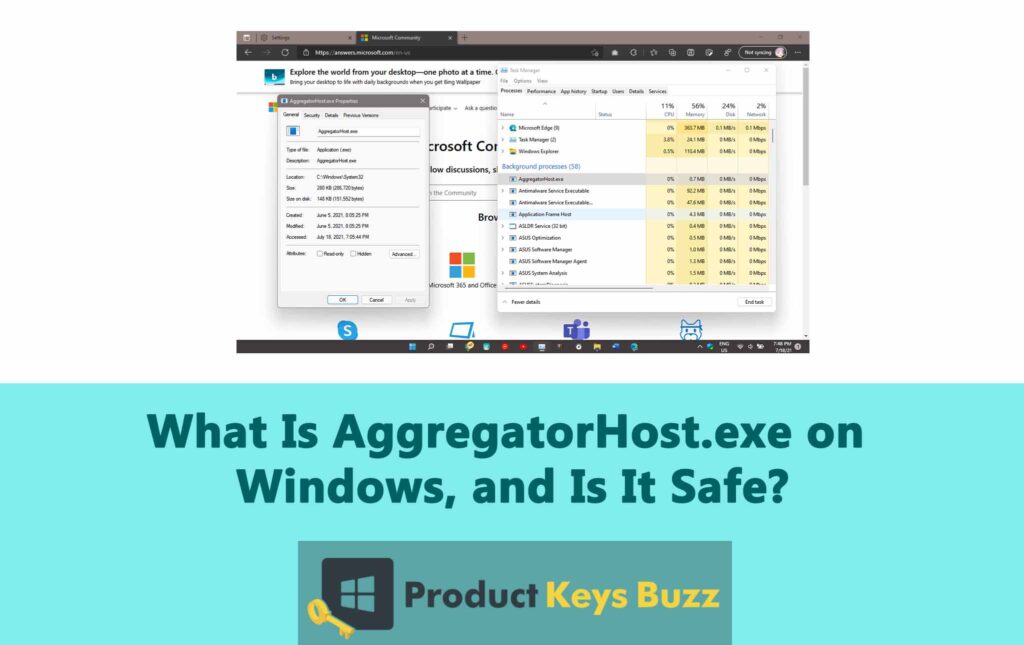When using Task Manager on your PC, you might notice AggregatorHost.exe silently running in the background. This could raise various questions in your mind. Like what it is or whether it is safe?
If you are seeking answers to these questions, you are in the right place. In this guide, we will cover everything you need to know about AggregatorHost.exe.
What Exactly Is AggregatorHost.exe?
AggregatorHost.exe is a process that quietly runs in the background. It is part of the Windows Insider Program, which tests new updates and features before they are released to the public.
The main purpose of this process is to gather telemetry data and user feedback from Windows Insider Program participants and send it to Microsoft for analysis. To give you a better idea, we have detailed some of the key functions performed by this file.
- Live Tiles and Notifications: This program manages the live tiles on the Start Menu, helping you to access real-time information from apps, like news headlines, calendar events, weather updates, and more.
- Notifications and Action Centre: AggregatorHost.exe handles notifications from various system events and apps. It also controls the Action Centre, where you can view and respond to these notifications.
- Taskbar Previews: When you hover your mouse over an icon on the taskbar, the small preview images that pop up are created and displayed by AggregatorHost.exe.
Normally, you can locate this file in the “C:\Windows\System32” directory along with Microsoft Corporation’s signature which indicates its authenticity. But sometimes, malicious programs disguise themselves as AggregatorHost.exe to avoid detection. So, you need to be careful of those fake files as they can be harmful to your PC. They might contain malware strong enough to corrupt your system.
Checking The Authenticity Of AggregatorHost.exe
It is always not possible to determine the authenticity of the AggregatorHost.exe process by just looking at the file. By chance, if you have malware disguised as AggregatorHost.exe, your PC will be at risk. This is why it is crucial to verify the legitimacy of the file as soon as you notice it lurking in the background.
To check the authenticity of the AggregatorHost.exe file, you should follow these methods.
Method 1: Verify the Location
If you suspect that the AggregatorHost.exe file on your PC is not authentic, you should start by verifying its location.
Here’s what you need to do:
- Open Task Manager by pressing Ctrl + Shift + Esc. You need to press all the keys together.
- Once you find the AggregatorHost.exe process in the list, right-click on it.
- Select “Open file location” from the menu. If the AggregatorHost.exe file is legit, it should be located in the “C:\Windows\System32” folder. But if you find the file in some other location, chances are it is malicious.
Method 2: Check the File Properties
Just checking the file’s location is not enough. You must also check the file properties to clear your doubts.
- Go to the AggregatorHost.exe file and right-click on it. Then select “Properties.”
- Go to the “Version” or “Details” tab and look for information such as the copyright, file version, and product name. Authentic system files usually come with detailed information.
Method 3: Check the Digital Signature
The authentic AggregatorHost.exe file comes with a digital signature from Microsoft Corporation. To check the signature, go to the Properties dialog, and open the “Digital Signatures” tab.
A legitimate file comes with a valid digital signature from the company. In case, the file doesn’t have a signature or the signature looks invalid, it is a red flag.
Method 4: Look for Publisher Information
Check for information about the company or publisher that created the file. As we mentioned before, all authentic system files are signed by companies. The same is true for Microsoft as well.
When Should You Disable AggregatorHost.exe?
While this program runs quietly in the background, sometimes it can cause problems like high CPU usage or concerns about its authenticity. In that case, you might want to disable the program to keep your system healthy.
Disabling the process is quite simple. All you have to do is follow these steps and you are done.
- Start by launching Task Manager and then go to AggregatorHost.exe.
- Click on the file and choose the “Disable” option.
- Once you are done, hit the “Confirm” button.
In case, you encounter issues with the file, try the solutions given below.
Solution 1: Run an Antivirus Scan
If you think AggregatorHost.exe is malware, don’t hesitate to use an antivirus program to scan your PC.
Solution 2: Use the System File Checker (SFC)
Malware can damage system files. Use SFC to check and restore the integrity of your system files. It will replace any problematic files with the correct ones.
Solution 3: Uninstall Suspicious Software
Check for any suspicious software on your system. If you find any, uninstall it using the Windows uninstall feature.
By following these steps, you can remove any harmful processes and keep your device healthy.
Is AggregatorHost.exe Safe?
AggregatorHost.exe is a legitimate Windows process associated with the Windows Update service. It’s safe and necessary for your system to function correctly.
However, some malware may disguise itself using this name to avoid detection. To ensure safety, you must verify the file’s location. If the file is genuine, it should be stored in the C:\Windows\System32 folder.
You can also scan your computer using reliable antivirus software to detect any potential threats. If you notice unusual behaviour, you should consider removing it, or else it might wreak havoc on your system.
How To Check If The File Is Digitally Signed Correctly?
Before you check the digital signature, make sure that the file is located in the C:\Windows\System32 directory. After verifying the location, you can check the digital signature using PowerShell. The good thing about this tool is that it works on all Windows versions.
Just follow the instructions as given and you are good to go:
- First, launch PowerShell. Unlike other tools, you don’t need admin rights to open the program.
- Enter the following command in the required space and hit the Enter key.
Get-AuthenticodeSignature -FilePath C:\Windows\System32\AggregatorHost.exe | Format-List
Look for these lines in the result
Issuer: CN=Microsoft Windows Production PCA 2011, O=Microsoft Corporation, L=Redmond, S=Washington, C=US
Status: Valid
If the Issuer is Microsoft and the Status is Valid, the file is safe and trustworthy.
Scan Your System For Viruses
If you suspect the authenticity of the AggregatorHost.exe file, you should scan your system for viruses. Here’s how:
- Access the Settings section on your PC by pressing Win + I.
- Navigate to the Update & Security section and select Windows Security, followed by Virus & Threat Protection.
- Choose Scan options, followed by Full scan, and then hit the Scan button.
- This will initiate the scanning process. You will be notified if the tool detects a virus on your system.
Run an SFC Scan
To run an SFC scan, you must follow these steps:
- Enter the Command Prompt in the search bar and select Run as administrator.
- Type in sfc /scannow and hit the Enter button to run the command.
Final Words
The AggregatorHost.exe file is itself not harmful, but malware in disguise is. The safety of this file largely depends on its origin and behaviour. If it’s part of the Windows operating system and located in the correct directory, it is safe and essential for the smooth functioning of certain Windows features. However, if you notice unusual behaviour or find the file in an unexpected location, it might be a sign of malware. So, make sure to scan your system and follow the other tips outlined in this post.
Table of Contents







